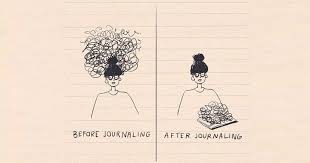Mental health has increasingly become a global conversation, with more people recognizing the importance of emotional and psychological well-being. While therapy, medication, and lifestyle changes are some of the most well-known ways to support mental health, a simple, yet profoundly effective, tool is often overlooked—journaling.
Journaling is more than just recording daily events. It is a mental and emotional outlet that allows individuals to process thoughts, work through complex emotions, gain insights into behaviors, and reduce anxiety.
In this article, we’ll explore the mental health benefits of journaling, different types of journaling, and how it can be integrated into daily life to enhance emotional well-being. We’ll also include relevant examples and actionable tips for getting started.
The Mental Health Benefits of Journaling
Journaling has been shown to positively impact mental health in various ways. Its benefits stem from the act of putting thoughts into words, a process that encourages self-reflection, problem-solving, and emotional regulation. Here are the main ways journaling can benefit mental health:
Stress Reduction
Writing about stressful or traumatic events can help individuals process their experiences, making them feel less overwhelming. Research shows that expressive writing, or writing about emotional experiences, can lower cortisol levels (a key stress hormone), leading to reduced stress and anxiety.
Example: Imagine someone going through a stressful work project. By journaling about their stress, they may begin to recognize patterns—perhaps that certain triggers, like meetings with a specific colleague, increase their stress. Recognizing this can help them take proactive steps to mitigate these stressors.
Emotional Clarity
- Journaling provides a safe space to express feelings and thoughts that might be difficult to share with others. This can lead to a clearer understanding of one’s emotions and behaviors, allowing for better emotional regulation and self-awareness.
- Example: A person struggling with anger may not immediately understand the source of their frustration. By writing down their feelings every time they experience anger, they might start to identify underlying causes—such as feelings of inadequacy or past trauma—leading to better emotional control and healing.
Cognitive Restructuring
Journaling can be a powerful tool in cognitive behavioral therapy (CBT), a psychological treatment that helps people challenge and change negative thought patterns. By writing about a negative experience and identifying irrational thoughts, an individual can learn to reframe those thoughts into more positive or balanced ones.
Example: After a bad day at work, someone might journal, “I failed the presentation, and now everyone thinks I’m incompetent.” Upon further reflection, they may write, “It was just one presentation, and I know my colleagues have seen my other successful work. I can learn from this experience.” This process of cognitive restructuring helps reduce anxiety and promotes healthier thinking.
Improved Problem-Solving
Journaling can enhance problem-solving skills. When individuals write about challenges they are facing, they may uncover new solutions or perspectives they hadn’t considered before.
Example: A college student who feels overwhelmed by academic pressures may start journaling about their workload. Through this, they may identify time-management issues or recognize the need to ask for help, leading to practical solutions for managing stress.
Enhanced Self-Awareness
One of the primary benefits of journaling is gaining insight into oneself. The process of documenting thoughts, feelings, and experiences helps individuals observe their patterns of behavior, understand their emotional responses, and track their progress over time.
Example: A person trying to manage their depression might keep a journal to track their mood daily. Over time, they may notice trends—perhaps their mood worsens when they don’t exercise or when they isolate themselves socially. These insights can guide them in making lifestyle adjustments.
Gratitude and Positive Reflection
Keeping a gratitude journal is a powerful way to reframe negative thinking and focus on positive aspects of life. By actively writing about things they are grateful for, individuals can foster a more positive mindset, which has been shown to improve mental well-being.
Example: A gratitude journal could include daily entries like “I’m thankful for the sunny weather today,” or “I appreciate my friend’s support during a difficult conversation.” Over time, this practice can shift attention away from what’s going wrong and toward what’s going right.
Types of Journaling for Mental Health
There are many types of journaling that can serve different purposes depending on an individual’s needs. Here are some popular journaling methods that support mental health:
Expressive Writing
This type of journaling involves writing about thoughts and feelings related to stressful or traumatic events. Research shows that writing about distressing experiences for 15-20 minutes a day over several days can lead to significant emotional and psychological improvements.
Expressive writing is particularly useful for individuals who have gone through trauma, are dealing with loss, or are struggling with ongoing emotional pain.
Example: After a breakup, an individual might use expressive writing to process their grief. Writing openly about their feelings of sadness, anger, and loss helps them acknowledge these emotions and start the healing process.
Gratitude Journaling
As mentioned earlier, gratitude journaling focuses on writing about the positive aspects of life. This practice is particularly beneficial for individuals struggling with depression or those who tend to focus on the negative. It encourages a positive outlook by highlighting things—both big and small—that one can be thankful for.
Example: Every day, a person might write three things they are grateful for, such as “I had a great conversation with a friend today” or “I enjoyed a peaceful walk in the park.”
Bullet Journaling
Bullet journaling is a highly flexible system that combines scheduling, goal-setting, and creative reflection. While traditionally used for organization, many individuals have adapted it for mental health purposes.
People use bullet journals to track moods, habits, and self-care activities, creating a structured way to monitor emotional well-being over time.
- Example: Someone managing anxiety might use a bullet journal to track daily stress levels, note triggers, and write about their coping mechanisms. Over time, they can review their entries and identify patterns, making it easier to avoid or manage triggers in the future.
Morning Pages
Popularized by Julia Cameron’s book The Artist’s Way, morning pages involve writing three pages of stream-of-consciousness thoughts every morning. This practice serves as a mental and emotional release, helping individuals clear their minds and make room for creative or productive energy. It’s especially beneficial for those who feel overwhelmed or stuck in their thoughts.
Example: Someone experiencing a mental block in their work might write morning pages to get their frustrations out on paper. Through this, they can achieve mental clarity and shift their focus to more positive or constructive thoughts.
Mood Journaling
A mood journal is specifically designed to help individuals track and understand their emotions. By noting daily moods and what might have influenced them, individuals can start to identify patterns and potential triggers. This type of journaling is particularly useful for people dealing with mood disorders like depression or bipolar disorder.
Example: An individual with bipolar disorder might track their emotional highs and lows in a mood journal, along with other factors like sleep, diet, and medications. This helps them recognize patterns in their mood swings and discuss these insights with their therapist or psychiatrist.
Goal-Oriented Journaling
Setting and tracking personal goals in a journal can be a motivating practice for mental health improvement. This type of journaling encourages individuals to reflect on their values and aspirations while creating a roadmap for achieving them. It promotes self-efficacy and a sense of purpose, both of which are crucial for mental well-being.
Example: Someone might set goals for self-care, such as meditating every day or attending therapy sessions regularly. By journaling their progress, they can stay accountable and celebrate small victories.
How to Start Journaling for Mental Health
For those new to journaling, starting can feel intimidating. Here are some practical steps to help integrate journaling into a mental health routine:
Choose Your Medium
Decide whether you prefer a physical journal or a digital one. Some people find the tactile experience of handwriting to be calming, while others prefer the convenience of typing. Both methods are effective, so choose whichever feels most comfortable.
Set Aside Time
Consistency is key. Set aside a few minutes each day, preferably at the same time, to journal. Morning or evening works well for many people, but the best time is whenever you feel most reflective or in need of emotional processing.
Start Small
You don’t need to write pages and pages. Start with a few sentences or even bullet points. If expressive writing feels overwhelming, consider starting with a gratitude journal, where you list a few positive things each day.
Be Honest
Your journal is a private space, so feel free to write openly and honestly. There’s no need to censor yourself. The more honest you are, the more beneficial the journaling process will be for your mental health.
Don’t Judge Your Writing
Journaling is not about writing perfectly. It’s about expressing yourself. Don’t worry about grammar, spelling, or structure—just let your thoughts flow.
Experiment with Prompts
If you’re struggling with what to write, prompts can be helpful. Examples include:
- “What am I feeling right now?”
- “What are three things I’m grateful for today?”
- “What is something that stressed me out today, and how did I handle it?”
Reflect on Your Entries
Occasionally look back on previous journal entries to see how far you’ve come. This reflection can provide valuable insights into your emotional growth and mental health progress.
Conclusion
Journaling is a simple yet powerful tool that can significantly enhance mental health. By providing an outlet for emotions, promoting self-awareness, and encouraging problem-solving, journaling helps individuals manage stress, anxiety, depression, and other mental health challenges.
Whether through expressive writing, gratitude journaling, or bullet journaling, the act of putting thoughts into words can lead to transformative emotional healing.
Remember, there’s no right or wrong way to journal. What matters most is the intention behind it—whether it’s to reflect, process emotions, or gain clarity.
Through regular journaling, individuals can cultivate a deeper understanding of themselves and build a foundation for improved mental health. So, grab a pen (or keyboard) and start writing your way to better well-being.

